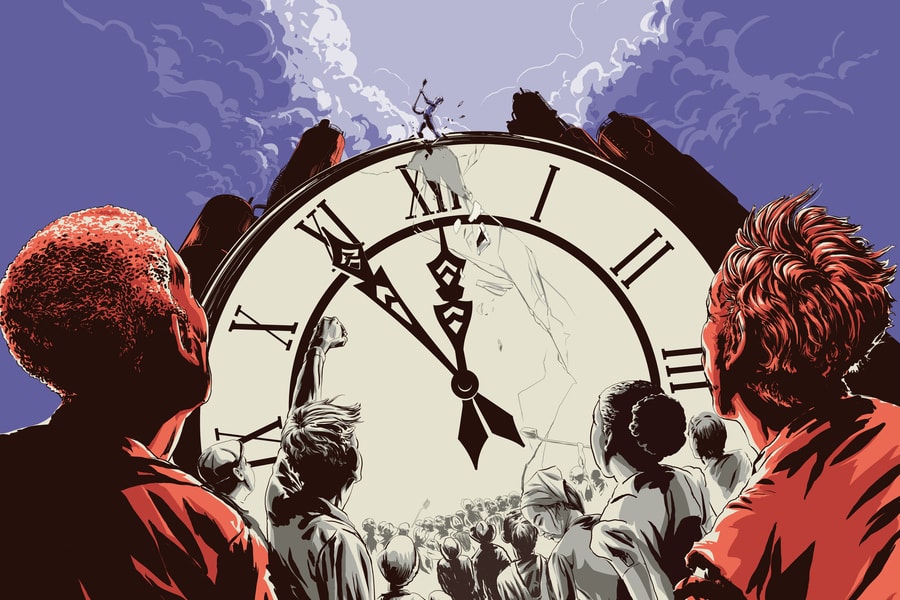The country is in an economic freefall, the nation’s collective health is at risk, and hope of a reprieve is hard to find. As economists and others draw parallels between now and the Great Depression, Steppenwolf Theatre Company has leaned in with an audio version of the Depression-themed Arthur Miller epic The American Clock, to be released June 18.
“The hopes raised and the hopes dashed are apparent in this script,” said actor and Steppenwolf co-founder Jeff Perry, who appears in the play. “You could call it a play about coping mechanisms.” He described how Miller, who wrote the play in 1980, was able to take the underlying tensions of daily life during the Depression and tinge almost every scene “with a strain of ‘What the hell is happening to normal?’”

The Chicago-based company took on the herculean task of adapting a work known for its grand scope and large cast of characters into a format that audiences can enjoy remotely. This “radio play production”—which includes such company members as Laurie Metcalf, John Malkovich, Joan Allen, K. Todd Freeman, and Kathryn Erbe—is part of a trio of virtual programs the theatre is offering in lieu of its canceled onstage season. The audio-only American Clock, directed by Austin Pendleton, will be available exclusively for season subscribers who committed to their memberships prior to the shutdown, although there are discussions of making a paid version available to non-subscribers in the future.
This project also served as an opportunity for Steppenwolf to employ a considerable amount of its ensemble. Production stage manager Laura Glenn oversaw the 33 company actors who took part. The play was produced almost entirely over phone and internet connections. Actors practiced and performed scenes together via Zoom, while recording their individual parts using voice memo apps on their smartphones. The sessions were virtual roundtables, and as such offered to reconnect during these isolating times.
“It was nice to be all of a sudden—even though it was virtual—in the same room with people once again,” said actor Gary Cole, who plays Arthur Robertson, the play’s narrator of sorts. “Even though we were all in our little spots, and we saw our little boxes on the screen there, we had fun like we always did in rehearsal, tearing apart scenes, talking about stuff.”
Actress and company member Karen Rodriguez also spoke fondly of these virtual sessions with the other actors involved with The American Clock, saying “it was like it was like being in a room with them, except you got more stories, because there was a lot more downtime. We got to really know each other in such a quick amount of time. I’ve been in the ensemble for two years, and that was just really special to me.”
Rodriguez had been starring as Julia in Isaac Gómez’s adaptation of Erika L. Sánchez’s I Am Not Your Perfect Mexican Daughter at Steppenwolf—what she called a dream job, in a production she took great pride in—when the theatre closed mid-run due to the pandemic.

Also canceled was the June and July run of Mia Chung’s Catch as Catch Can, which was to feature Cole’s Steppenwolf return. The company held out for as long as possible but opted to cancel Catch as Catch Can before rehearsals started. Cole was disappointed, having been excited to work with its director, Amy Morton, whom he has known and worked with for 30 years. “I was looking forward to that, and I was looking forward to being back at the theatre,” he said. “It would have been an even 20 years since I’d been onstage in Chicago.”
For Cole and the rest of the actors involved with The American Clock, each rehearsal and recording session was highly organized. Stage manager Glenn was on every call of every scene, along with assistant production manager Elise Hausken and sound supervisor Martha Wegener, as the three made sure the actors followed a strict protocol for recording their parts. “When we would start recording,” Glenn said, “it was my job to say, ‘Okay, let’s all make sure our phones are on airplane mode. Let’s go ahead and start your voice memo.’ And then I would keep track of the time, and then I’d say, ‘Okay, hang on, everyone hit stop. Go ahead, turn your phone off airplane mode. Let’s all now send it to Elise.’” This process ensured that each memo file was small enough that it could be transferred by email, thus avoiding the extra step of using file sharing programs.
The team had some practice in producing this sort of virtual programming. When restrictions were put in place due to the pandemic, Steppenwolf scrambled to re-envision the rest of its 2019-20 season for its ticketed members. The other two “virtual productions” are an upcoming virtual reading of ensemble member Tarell Alvin McCraney’s In the Red and Brown Water and a May Zoom adaptation of Chekhov’s The Seagull, called (Virtual) Seagull. These, along with the company’s ongoing Half Hour podcast, prepared the staff to take on transforming hours of voice memos into a “radio play” that the theatre says “invites members to sit back, power down their screens, and let the power of a well-told story spark the imagination” for over two hours.

Rodriguez had the opportunity to work on both the production of (Virtual) Seagull and The American Clock, and recognizes that these are very different formats through which to consume a production. “It just goes back to storytelling,” said Rodriguez of the all-audio production. “It’s super personal, having Laurie or Jeff or Jon Michael Hill in your ear. There’s something beautiful about that.”
The American Clock follows Moe and Rose Baum and their teenage son, Lee, but it is also a patchwork of other Depression-era stories and perspectives featuring more than 30 characters. Perry, who plays Moe Baum, likened the play to murals by artist Diego Rivera or Works Progress Administration (WPA) artists, each multilayered in its representation of people and communities. Stripped from the stage and devoid of visuals, the Steppenwolf production can be experienced only by listening.
Cole believes this audio version gives Miller’s work a different kind of impact. “When I went to Illinois State University, they had archives there, and they actually had an audio version of Death of a Salesman,” he said. “The words, the language—because that’s all that there is—really is featured. So you’re imagining what’s going on with these people, but the words themselves land in a different way.”
Pendleton, who appears in the show as well directing it, has a long history with Miller and specifically with this play, having directed it first at the Williamstown Theatre Festival in 1988 and later at HB Studio, where he was teaching.
Miller’s 1980 play is woven through with threads of hope and despair, alternating between great highs and dark lows. Critical reactions to the show have rivaled these stark swings; Pendleton remembers Miller taking the mixed reviews in stride, saying to him that “this business is a roller coaster.” Indeed it received raves when it premiered at the Spoleto Festival USA in Charleston, S.C., but was blasted months later when it moved, after some revisions and a change in director, to Broadway. New York Times theatre critic Frank Rich, who saw both performances, wrote of the Broadway production that “the once beautiful pieces of The American Clock have been smashed almost beyond recognition.”
Yet Pendleton confessed a soft spot for the work. “I think he decided to dis-obligate himself from the usual rules of structure,” he said of Miller. “He just writes totally freely. The scenes are almost like jazz, and he knows how to do this superbly. He’s not making every line move the action forward and all that—he just kind of lets it rip. That’s something I’ve always loved about the play.”
Sarah Tietje-Mietz is a Goldring Arts Journalism graduate student at Syracuse University.


